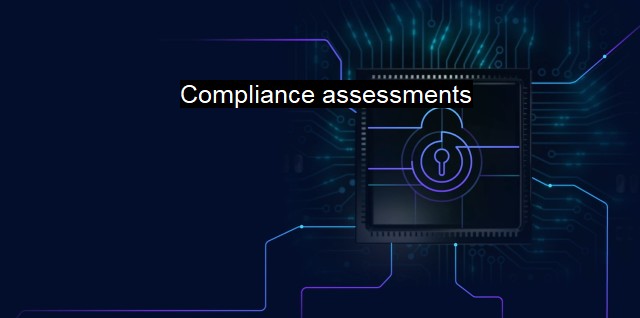What are Compliance assessments?
Maintaining Cybersecurity: The Importance of Compliance Assessments in Meeting Regulatory and Industry Standards for Antivirus and Threat Protection
Compliance assessments are vital aspects of cybersecurity and antivirus measures. They involve the process of reviewing and assessing whether a business or an organization's systems are being run in accordance with set standards and regulations. With growing cybersecurity threats such as hacking, data breaches, viruses, and other malware, it is necessary for organizations to fully abide by these established standards to reduce threats and ensure their cybersecurity architecture remains powerful and up-to-date.Cyber compliance is an avenue for ensuring standard implementation against cyber threats and wrongful invasion. These standards spell out the measures to be utilized by organizations for effectively protecting against these threats. They range from basic security measures like use of antivirus software to more complex strategies such as implementing advanced threat protection, firewall systems, and and securing infrastructures.
Upon the implementation of these standard systems, it is necessary to carry out compliance assessments to evaluate the effectiveness and efficiency of the systems. This evaluation helps to validate that these systems are regulated, operated, and enforced. The crux of the assessment is to identify the vulnerabilities and improve the organization's cybersecurity posture to meet or exceed set regulations or standards.
Due to the evolving landscape of cybersecurity threats, compliance standards do not remain stagnant. They undergo regular updates to ensure they capture most, if not all, cybersecurity risks. Hence, the need for periodic compliance assessments becomes extremely salient. This allows organizations to adapt their implemented security measures to the current demands of technology and cyber threats—thereby comfortably keeping pace with the speedy metamorphosis of the cybersecurity environment.
In the context of antivirus specifically, running compliance assessments relates to ensuring that antivirus software is readily available, consistently updated, driven by updated database definitions, and functional on all devices within an organization’s network. These assessments ensure that any new cybersecurity threats are rapidly discovered and addressed, thereby reducing potential risks.
The assessments also extend to testing the general use of the antivirus software like the data scanning process, software updates, system monitoring, and addressing of threats and risks identified by the software. Here, the organizational policies and regulations on antivirus use are ascertained abided by, and if not, necessary changes made.
Compliance assessments stand as reliable safety checks that increase confidentiality, reliability, and data integrity. By divulging loopholes and vulnerabilities within the systems, businesses can take corrective action in time to prevent a potential cybersecurity threat – all of which is made possible through these assessments.
Compliance assessments in the area of cybersecurity and antivirus play significant roles in the overall security management of a firm's resources. Ensuring the cyber consistency of systems while bolstering their reliability against potential breaches adds to the value of robust compliance processes. They not only measure the resilience of an organization against threats but provide a framework for improvement and advancement. In a world where cyber threats continuously evolve, compliance assessments provide an excellent tool for ensuring cybersecurity and antivirus solutions are always one step ahead of potential threats.

Compliance assessments FAQs
What is a compliance assessment in cybersecurity?
A compliance assessment in cybersecurity is an evaluation process that determines whether an organization is adhering to the relevant security regulations and standards mandated by industry bodies or government agencies. The assessment helps to identify potential security risks and vulnerabilities in an organization's IT infrastructure and systems.Why do organizations need a compliance assessment for antivirus software?
Organizations need a compliance assessment for antivirus software to ensure that they are meeting the necessary standards of protection against malware and other cyber threats. Compliance assessments determine whether antivirus software is being used effectively and updated regularly to protect against known threats. This helps organizations to maintain a robust cybersecurity posture and avoid data breaches or other threats.What are the benefits of a compliance assessment in cybersecurity?
Conducting a compliance assessment in cybersecurity has several benefits, including identifying potential vulnerabilities in an organization's IT infrastructure, reducing the risk of cyber threats, enhancing the effectiveness of security controls, and meeting regulatory requirements. Additionally, conducting a compliance assessment can help organizations to establish a culture of security awareness and promote best practices for cybersecurity.Who should conduct a compliance assessment for antivirus software?
A compliance assessment for antivirus software can be conducted by an internal IT team or an external auditor. The auditor should possess the necessary expertise and experience to assess the organization's security posture and provide recommendations for improvement. It is important to choose an auditor who is independent and unbiased to ensure a comprehensive assessment.| | A | | | B | | | C | | | D | | | E | | | F | | | G | | | H | | | I | | | J | | | K | | | L | | | M | |
| | N | | | O | | | P | | | Q | | | R | | | S | | | T | | | U | | | V | | | W | | | X | | | Y | | | Z | |
| | 1 | | | 2 | | | 3 | | | 4 | | | 7 | | | 8 | | |||||||